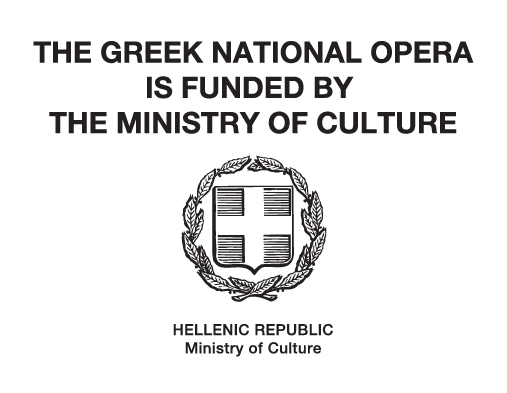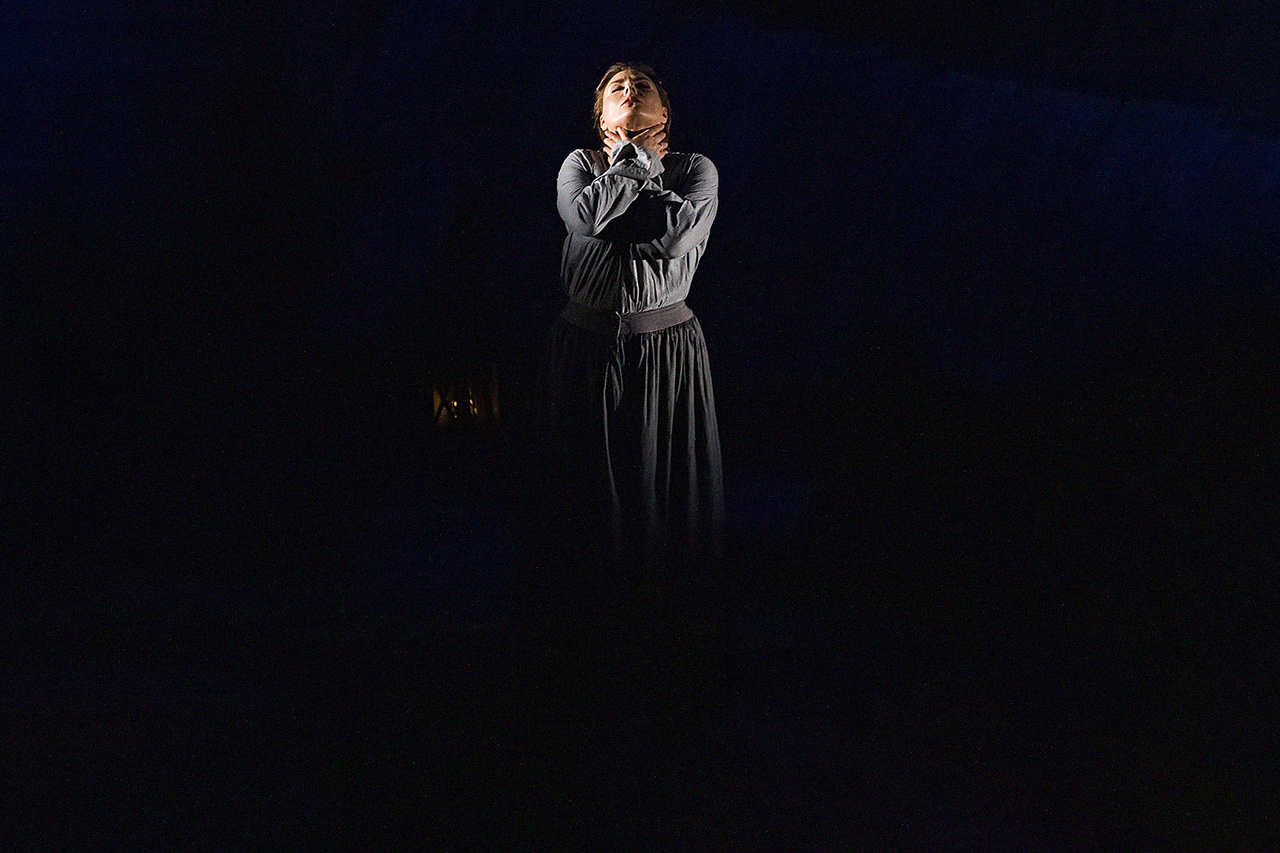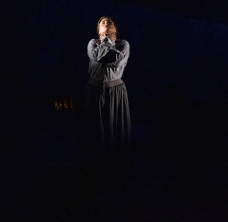�

�
GNO lead donor
![]()
�
The Greek National Opera is reviving one of the most popular productions to have graced its stage in recent years. Following the rave reception it drew from Athens audiences back in 2019, Lady Macbeth of Mtsensk -an iconic opera of the 20th century and a breathtaking Dmitri Shostakovich masterpiece- is returning to the Stavros Niarchos Hall of the GNO at the Stavros Niarchos Foundation Cultural Center on 21, 24, 27, 31 October and 5, 9 November 2023. Conducting is Fabrizio Ventura, while the production's successful staging is by Fanny Ardant, working with an all-star international creative team. This production is made possible by a grant from the Stavros Niarchos Foundation (SNF) to enhance the GNO's artistic outreach.
The plot of this opera, based on a novella by Nikolai Leskov, centres on the wife of a wealthy merchant, Katerina Ismailova, who feels neglected and trapped in her marriage. She falls in love with one of the workmen at her homestead and, for his sake, ends up murdering both her father-in-law and her husband. Katerina marries her beloved but when the murders are exposed, the couple is arrested. On the road to Siberia, Katerina gets into a fight with some new prospective mistress of her husband and the pair get swept away by the freezing waters of a river. Shostakovich tackles the place of women within pre-revolutionary rural Russia and cuttingly satirises institutions of his day, such as the church and the tsarist police.
Dmitri Shostakovich was born in 1906 in Saint Petersburg and ranks among the most important composers of the 20th century. His relationship with the Soviet regime, especially during the Stalinist period, was not an easy one as his style was not compatible with official directives on art, leading to him twice being publicly accused of formalism. Though influenced by Igor Stravinsky's neoclassical works, and by the style of Gustav Mahler in his symphonic music, he nevertheless forged an utterly recognisable, signature polystylistic idiom. He wrote works of all kinds, including 15 symphonies, six concertos, 15 string quartets, choral works, music for ballet and the cinema, works for piano, song cycles, and operettas. He completed two operas -The Nose (1930) and Lady Macbeth of Mtsensk (1934; revised and renamed Katerina Ismailova in 1962)- and left behind drafts for a good few more. He died of lung cancer in 1975.
Before coming to be considered one of the most popular works of the 20th century, Lady Macbeth of Mtsensk was banned by the Stalinist regime. When first presented in 1934 at one of the oldest opera houses in Russia, the Mikhailovsky Theatre, and a little later at Stanislavski's Moscow Art Theatre, the work was enthusiastically received and immediately lauded as the most important opera of the Soviet era. A few months later, on 26 December 1935, the work was staged at the Bolshoi Theatre in Moscow where, a few days later, it would be seen by Joseph Stalin, who walked out before the end of the performance. Not long later, in an issue of the Pravda (�Truth�) broadsheet -the official newspaper of the Communist Party of the Soviet Union- he published an article titled �Muddle instead of music: On the opera Lady Macbeth of the Mtsensk District�. This was a terrible blow for the composer, who would not complete another opera till the day he died, though he did leave behind a number of drafts.
While Shostakovich revised the score after Stalin's death, he was still barred from presenting the opera. The green light he so desired was only given in the 1960s, which led to his revised version of the work touring the world as one of the most important operas of the 20th century. The opera owes much of its power to the great variety inherent within its intensely poetic music. The work sets itself apart not only through its rawness and brutality but also because it is affecting on an equally deep level - and not just in its climactic scene, which manages to capture and encapsulate centuries of pain and deprivation in Russia.
The staging of this production was created in 2019 by Fanny Ardant, a major figure of the French cinema and theatre scenes. Ardant -the star of dozens of films and plays, Truffaut's muse, Zeffirelli and Polanski's leading lady, and a singular �woman next door� at the side of Depardieu- tackled a work of opera for the first time here, and most successfully so, following a commission from the Greek National Opera, and having previously directed two works of musical theatre at the Théâtre du Châtelet in Paris (Messager's Véronique in 2008 and Sondheim's Passion in 2016). Her bold and poetic staging spotlights such elements as personal freedom and daring, as well as blazing extremes. The director notes: �Lady Macbeth sets a mirror before us. And in it, we see our own selves. Lady Macbeth is our wild reflection, restless and free. How can the part of ourselves that fights back against the law survive within conventional, homogenised society? To love criminals is a risk. And it is one I take. I love Katerina Ismailova. She is not only one of Leskov's characters in an opera by Shostakovich - no, she is also an ever-present individual, even in our own time. And if we pay close enough attention, we may well encounter her. I love those who fear not judgement, nor the sanctions of society, nor political parties and factions and groupthink. I watch them live their lives walking a tightrope, ready to snap perhaps, but all aquiver and incandescent. I dread the moment they will fall. I understand that they would rather die than destroy their dreams. I accept that they are a danger to society - that of merchants and of profit. I admire the price they are willing to pay to remain free, in pursuit of their passions. To be held accountable forms part of their own rules governing the game. I am glad they have journeyed through life like stars in a solar system whose own sun is black. I adore the story of Katerina, that Lady Macbeth of the Mtsensk district. To me, she is like an icon. I received her as a gift, one that I would now like to offer you all. I said to myself: the era, the politics do not matter. The circumstances, the setting do not matter. The laws in question do not matter. There will always be those who obey and those who command, those who follow and those who lead, those who wait in line and those who simply leave it behind, on some day or other, having waited so long for a happiness violent and true, because the siren song of life is more powerful than all else. And so, I have kept Lady Macbeth in the district of Mtsensk, in her province, in the tsarist Russian Empire, in her habitat - that of the merchants. Shostakovich's music, richer and with starker contrasts than the text itself, recounts the complexities of Katerina and her rivals, how her melancholy was overcome by anger, by blasphemy, by an act that cannot be undone, how this incongruous and scandalous heroine makes us want to live, even -and in the main- dangerously. And since I have been welcomed to Greek shores, may the Olympian gods -if they deign glance down on me- guide and protect me.�
This production is the creation of an extraordinary creative team headed by Fanny Ardant, comprising Tobias Hoheisel, Milena Canonero and Petra Reinhardt, Luca Bigazzi, and the Collectif (LA)HORDE.
The versatile sets are by the award-winning German set designer Tobias Hoheisel. Hoheisel has worked on highly successful theatre productions at such venues as the UK's National Theatre, Royal Shakespeare Company, Almeida Theatre and Royal Court in London, Schaubühne in Berlin, the Austrian National Theatre, and the Edinburgh International Festival. He has also distinguished himself in the field of opera, designing sets for productions at the most major opera houses across Europe and the United States, including the English National Opera, the Royal Opera House in London, Wiener Staatsoper, Staatsoper Berlin, Deutsche Oper Berlin, Opéra national de Paris, the Gran Teatre del Liceu in Barcelona, La Scala in Milan, Opéra national de Lyon, and La Monnaie in Brussels, as well as the Lyric Opera of Chicago, the San Francisco Opera, and the New York City Opera.
The costumes have been co-created by two incredible costume designers: multiple Oscar winner Milena Canonero, and Petra Reinhardt, renowned for her work with Robert Carsen.
The celebrated costume designer Milena Canonero has won four Oscars, for her work on Stanley Kubrick's Barry Lyndon, Hugh Hudson's Chariots of Fire, Sofia Coppola's Marie Antoinette, and Wes Anderson's The Grand Budapest Hotel, and has also created costumes for other legendary films (including A Clockwork Orange, 2001: A Space Odyssey, Midnight Express, and Out of Africa, to name but a few). Alongside her work in film, for which she is greatly sought-after and highly discerning when it comes to the projects she accepts, she also designs extraordinary costumes for major opera productions at such leading houses and events as the Metropolitan Opera, Opéra national de Paris, La Scala in Milan, the Salzburg Festival, and Wiener Staatsoper.
Petra Reinhardt is a German costume designer for the theatre and opera. Her main aim is to convey each work's narrative through the costumes, as well as to follow the wishes of the director and creative team, and to give voice to all those wearing her costumes so that they might speak to the other performers, but most of all to audiences. Following her career trajectory in Germany, Reinhart has presented her work across Europe, and in China. In recent years, she has worked closely with the renowned opera director Robert Carsen at such opera houses and events as Opéra de Lausanne, La Scala in Milan, Opéra Comique in Paris, Komische Oper Berlin, and the Baden-Baden Festival, to name but a few.
For the purposes of this production, Fanny Ardant chose the French artists Collectif (LA)HORDE (Marine Brutti, Jonathan Debrouwer, Arthur Harel) to serve as movement coaches. (LA)HORDE was founded in Paris in 2013 and became known for the choreographies they create with communities of non-professionals over the Internet. They work with people on the fringes of dominant culture without any interest in hierarchy - with persons aged over 65, for example, with the blind, with teens, and so on. According to Le Nouvel Observateur magazine, (LA)HORDE are active in that vital space between dance, the visual arts, and performance, and are inspired by shows, films, and books. They have headed Ballet national de Marseille since 2019.
The lighting of this production is designed by the internationally acclaimed and multi-award-winning Italian cinematographer Luca Bigazzi, known for his work on Paolo Sorrentino's lauded films and for his collaborations with Abbas Kiarostami.
Conducting the production is the Rome-born Italian maestro Fabrizio Ventura, who is partnering with the Greek National Opera for the first time. Following his appearances over many years on some of the world's greatest stages, in Stockholm, Copenhagen, Oslo, Prague, London, Rome, Turin, Verona, Nice, Essen, Sydney, Montreal, and elsewhere, the time has come for this talented conductor to appear in Athens before GNO audiences.
In the title role is the outstanding Russian soprano Svetlana Sozdateleva, whose singular vocal prowess and stage presence so impressed critics and audiences alike at the production's premiere back in 2019 - a soloist who has successfully performed the role of Katerina Ismailova in Moscow, Oslo, Helsinki, and elsewhere, and who has appeared at leading opera houses in Brussels, Berlin, Bologna, Munich, and Saint Petersburg, to name but a few. Following her appearance in the GNO's 2019 production, she went on to perform the role at the Metropolitan Opera in New York to highly positive notices.
The role of Sergey is to be performed by the tenor Sergey Semishkur, a soloist at the Mariinsky Theatre in Saint Petersburg, following his exceptional performance in 2019. His repertoire includes roles drawn from Italian opera and the entirety of the Russian school, not to mention French opera and even Janáček operas. He has worked with such celebrated directors as Graham Vick and Dmitri Tcherniakov, and such leading conductors as Valery Gergiev, Philippe Auguin, Plácido Domingo, and Gianandrea Noseda. He has given performances at the Metropolitan Opera, Carnegie Hall, and the Barbican, in Salzburg and Berlin, and elsewhere.
Performing the role of Boris is the celebrated Greek bass-baritone Yanni Yannissis, who garnered rave reviews in 2019. Alongside his career in Greece, he has also appeared at the world's most major opera houses, including the Metropolitan Opera, La Monnaie, the Scottish Opera, and Oper Frankfurt.
Appearing with them are the established and emerging Greek National Opera soloists Yannis Christopoulos, Sophia Kyanidou, Maxim Klonovskiy, George Mattheakakis, Nikos Katsigiannis, Charalambos Velissarios, Panagiotis Priftis, Nicholas Stefanou, Andreas Karaoulis, Vangelis Maniatis, Tassos Apostolou, Petros Magoulas, Marissia Papalexiou, and Maria Mitsopoulou. Agathangelos Georgakatos is chorus master of the GNO Chorus.














